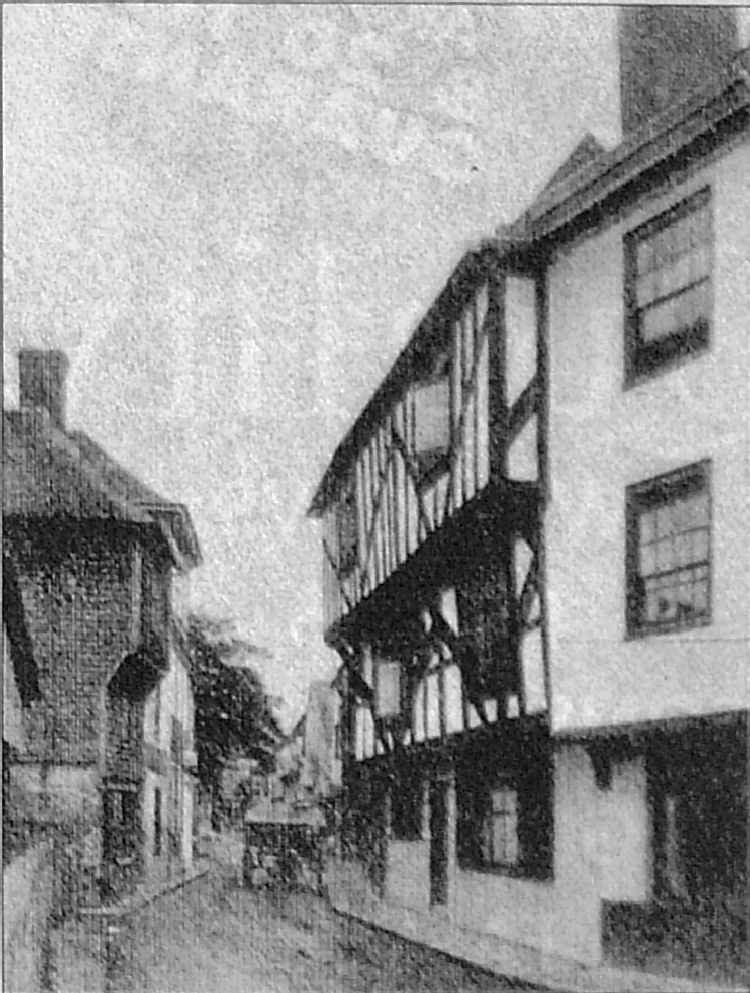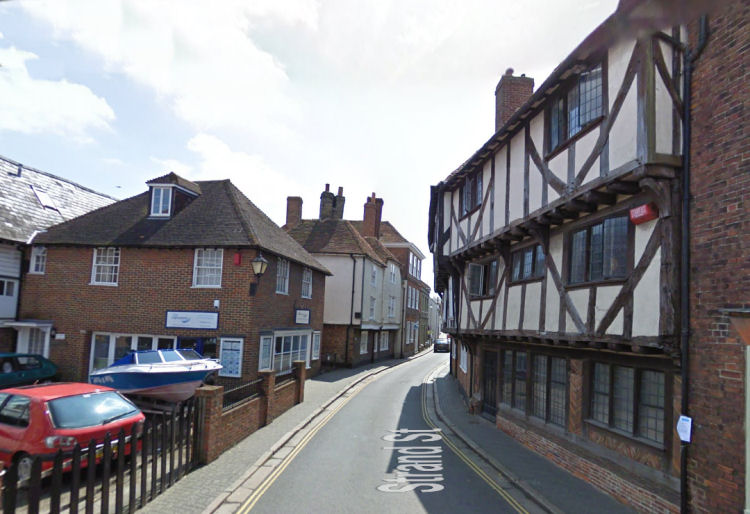|
32
Strand Street
Sandwich

Photo left, shows the old "Dolphin" |

Above showing the same area in July 2009 from Google. |
From 1638 or possibly previous.
In 1642, at the beginning of the Civil War, The Town Cryer declared that
men should report to the "Three Kings," the
"Fleur de Lys," the "Dolphin," and
the
"Black Bear," if they were willing to take employment under the command of the
Earl of Essex, in defence of His Majesty Charles I. Only Three recruits came
forward! The people seemed more interested in coastal defence.
According to historian David G Collier, in 1648 it was also used by
Captain Thomas Boys as well for a Royalist Army recruiting centre, and in
1682 it hosted a meeting of prominent townsfolk who were concerned by the
growing number of Protestant dissenters who were settling in Sandwich, but
whether their concerns were on religious grounds, or lack of employment for
locals, is not clear.
The inn may have a French connection through its name, as "Dolphin" may
be a corruption of the French 'Deaufin' a title given to the eldest son of
the French king in the Middle Ages, when every English monarch too
considered himself king of France - thus the Deaufin was also the Prince of
Wales.
It appears to have been tied to a brewery owned by the prominent Sandwich
family, the Wyborns to 1822. In 1764 William Wyborn, brewer, died and his
business was left to his daughter Mary, who had married John Bradley. Their son,
William Wyborn Bradley was born in 1752 William being described as "common
brewer of Sandwich." William was elected Mayor Sandwich in 1785 and died in
1788. The Sandwich brewery and its tied estate of 27 pubs was eventually put up
for "sale by private contract" by William's son (also called William Wyborn
Bradley, born 1779) as advertised in the Kentish Gazette on 10th May 1822.
The pub changed name to the "Bricklayers
Arms" and later, date unknown, back to the "Dolphin again.
|
From the
https://www.british-history.ac.uk/no-series/court-of-chivalry/6-argent-crayford
March 1638 - February 1639.
William Argent of Eastry, co. Kent, esq v William Crayford of London and Mongeham, co. Kent, gent.
Argent complained that around March 1636, at the "Pelican Inn" in
Sandwich, Kent, at 'an ordinary where gentlemen meete' on a market-day
Saturday, Crayford had insulted him by taking the place above him at the
table and then declaring that 'I was a base fellow and no gentleman, and
that none of my ancestors were gentlemen, and that he would prove me so
whensoever he met me, that he would kill me or I him, and badd some or
one present tell me so to my face.' Crayford was married to the daughter
of Argent's wife, 'Lady Mary Nevinson' [sic], widow of Sir Roger
Nevinson. In his defence he claimed to have been systematically vilified
by 'Lady Mary' whilst staying in Argent's house at Eastry during his
wife's pregnancy. 'Lady Mary' told him that 'he came sneaking up and
down the country till she took him in and married her daughter to him',
persistently called him 'Will foole' and tried to bar him from his
wife's bedroom. About a month before the incident in Sandwich, Argent
had assaulted him in the house, leaving him with a bloody nose. He
therefore insisted that his action had been provoked, although Argent
claimed in interrogatories for Ann Price in Crayford's counter suit that
the local minister had reconciled this quarrel and the two men had
'received the sacrament of the Lord's Supper together.'
The commissioners, led by Sir Edward Boyes, took depositions on
Argent's behalf at the "Dolphin Inn," Sandwich, on 17 May 1638, with the
witnesses including Thomas Blechenden, esq, Edward Boyes, esq, and John
Gookin, gent, all of whom, had been present at the original dinner.
Depositions for the defence were taken at the "Chequer Inn," Canterbury,
on 17 August 1638, with the commission led by Sir Edward Master and the
witnesses including Argent's former butler and Mrs Crayford's nurse. The
result of the case does not survive, but despite late efforts at
arbitration, the sentence was ordered to be heard on 23 February 1639.
|
|
Kentish Gazette, 26 June, 1792.
To be sold by auction. At the "Rose Inn," in Sandwich, on Monday the
2nd day of July next, about 5 o'clock in
the afternoon.
Unless in the meantime disposed off by private contract.
All that freehold messuage or tenement formerly called or known by
the name or sign of the "Dolphin" with the
buildings, cellars, ground and appurtenances thereunto belonging,
situate near the Bridge, in the parish of St.
Clement, in the town and port of Sandwich, and now in the several
occupations of Mark Westol and James
Abbott, or their undertenants.
For particulars enquire of J. Solly, Attorney-at-Law, Sandwich.
|
|
Kentish Gazette, 29 June, 1792.
Notice.
The public is respectfully informed, that the sale of the Messuage,
formerly called the "Dolphin," in St. Clements,
Sandwich, advertised for Monday next, is postponed until further
notice.
|
|
Kent Herald, 17 November 1825.
Freehold public houses, and other Estates, in Sandwich.
For sale by auction, by Messers. Pott and Denne, at the "Bell Inn," in Sandwich,
on Monday, at 12th day of December, 1825, at 11 of the clock in the Forenoon
precisely, the following very desirable Freehold Public Houses and Estates,
situate in the town and port of Sandwich, in the county of Kent, in separate
lots, Viz:-
The "Three Colts," public house.
The "Sun" public house.
The "George" public house.
The "Salutation" public house.
The "Crispin" public house.
The "Dolphin" public house.
The "Black Bear" public house.
The "Green Posts" public house.
The "King's Head" public house.
The "King's Arms" public house.
The "Ship" public house, with cottage and premises adjoining.
The "Swan" public house, with a Stables used therewith, and a cottage in Delf
Street, adjoining.
The "Two Brewers," public house, with cottage adjoining.
The "Bell Inn and Tap," with Assembly Rooms, coach house, and stables, &c.
The "Three Kings Inn," with dwelling house adjoining, and extensive stabling,
&c.
The "New Inn," with Assembly Room, Theatre, Stables, Yard, &c.
The Dwelling Hand School Rooms, in Delf Street, in the occupation of Miss
Stuart.
A Drwlling House in Delf Street, with Malt House and Cottage adjoining.
A Malthouse near Moat's Hole.
A new built Messuage or Tenement, in the occupation of the Widow Solley.
A Messuage or Tennament, in Strand Street, adjoining the "Crispin," in the
occupation of Richard Ewell.
A Messuage or Tenement, in two dwellings, in Locksboat Street, in the occupation
of Henry Farmer, and George Jeffrey Edmunds.
A Stable, with Lofts over the same, and large Garden, Summer House, and
Premises, on the Great Quay, near Quay Gate, in the occupation of Thomas Mead.
The Premises may be viewed on application to the respective tenants, and printed
particulars had, seven days prior to the sale, of the Auctioneers, and at the
office of Mr. Noakes, Solicitor, Sandwich.
|
|
Kent Herald, 15 December 1825.
An extensive sale of estates, consisting of various freehold public houses and
other property, took place in the town and port of Sandwich, on Monday last. It
may not be uninteresting to give the amount for which each house sold.
The "Three Colts" £780.
"Sun" £550.
"George" £405.
"Salutation" £540.
"Crispin" £750.
"Dolphin" £335.
"Green Posts" £365.
"King's Head" £455.
"King's Arms" "£900.
"Ship" £510.
"Swan" £860.
"Three Kings" £710.
The "Bell, with Tap," &c. and Assembly Rooms, since sold for £2,000.
The "New Inn," "Two Brewers," and "Black Bear," did not sell.
Mr. Noakes was the Solicitor and Messers. Pott and Denne, of sandwich, were the
auctioneers.
|
|
|
LICENSEE LIST
MILES William 1823+

 From the Pigot's Directory 1823 From the Pigot's Directory 1823
|

